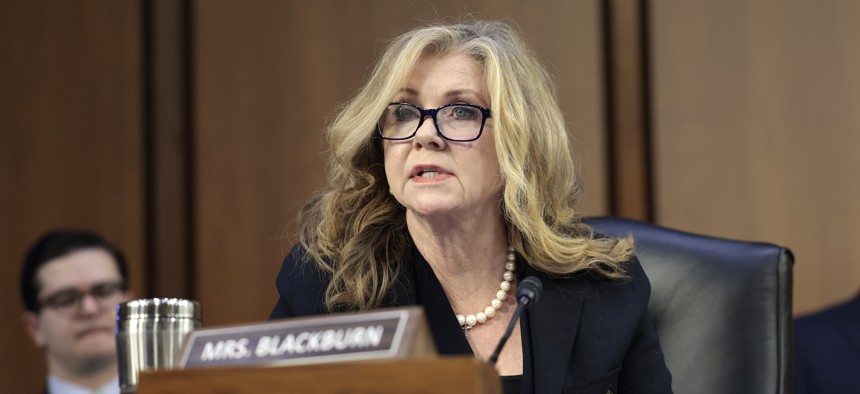Warner, Blackburn team up to reestablish U.S. leadership in international tech standards

Sen. Marsha Blackburn, R-Tenn., shown here at a committee hearing in 2022, is co-sponsoring legislation to restore the U.S. as a key leader in developing international technology standards. Anna Moneymaker/Getty Images
New bipartisan legislation would ask NIST to help the U.S. establish a stronger international presence in setting emerging technology standards.
Two senators are looking to legislation to establish U.S. as a leader in developing global standards for critical and emerging technologies, with a focus on staying competitive internationally.
The Promoting United States Leadership in Standards Act of 2024, introduced by Sens. Mark Warner, D-Va., and Marsha Blackburn, R-Tenn., looks to ensure the U.S. leads the development of internationally agreed-upon rules and regulations for critical and emerging tech like artificial intelligence, biotechnology, quantum computing and more.
The bill names China as the main rival to the U.S. in developing these standards. This threat is twofold; whichever country leads in developing standards for emerging tech systems will both broadly dictate their application and usage, as well as secure market power for that nation’s individual companies.
“In recent years, the Communist Party of China has asserted their dominance in the global technology space, and as their status has risen, our authority and influence has fallen,” said Warner in a press release. “This legislation clearly outlines steps we must take to reestablish our leadership and ensure that we are doing all we can to set the global standards for critical and emerging technologies.”
The legislation would task the National Institute of Standards and Technology with submitting a report to Congress to summarize current U.S. participation in international standards development, create a user-friendly web portal to help stakeholders navigate this landscape and establish a pilot program to award $10 million in grant funding for U.S.-based standards meetings.
Within the third year of the grant program, NIST would then be required to prepare another report documenting the program's expenditures and efficacy.
“In response to the concerns about diminishing U.S. leadership in international standards setting activities, this bill aims to improve visibility into standards setting related to emerging technologies and increase U.S. participation in these critical activities,” the bill summary reads.
The federal government as a whole and NIST specifically have been already working to boost U.S. leadership in standards-setting — particularly in response to growing Chinese influences in emerging tech fields — for several years. Following President Joe Biden’s wide-ranging executive order on AI, however, NIST has been tasked with an increasing workload focused on AI and other emerging technologies.
NEXT STORY: US signs on to international principles for 6G



